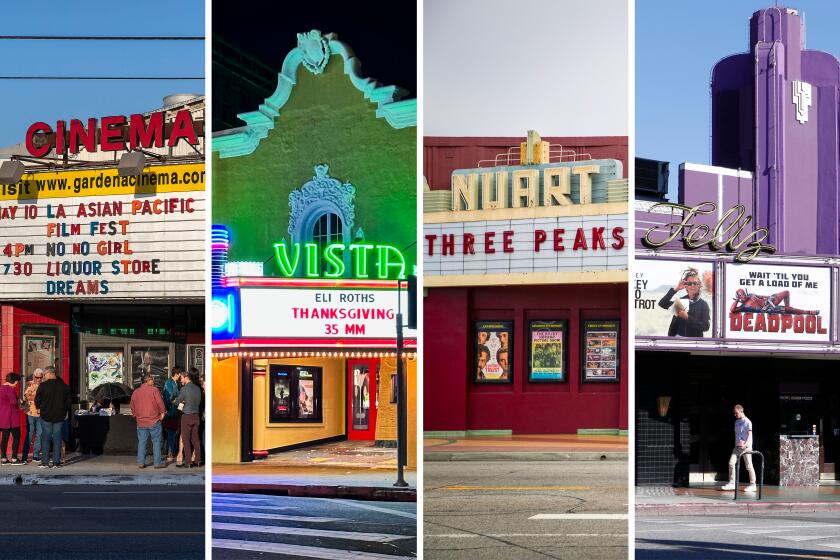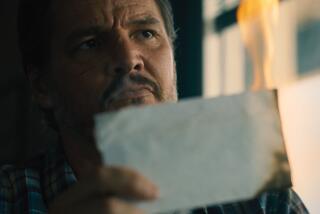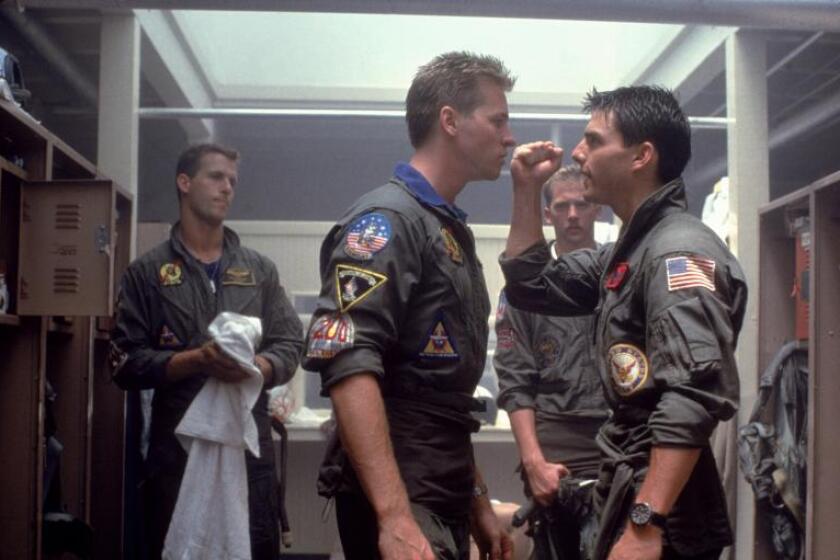
- Share via
“Drop,” the latest sitcom-y slasher by director Christopher Landon (“Happy Death Day,” “Freaky”) is an overzealous techno-thriller about a blind date that gets deadly by dessert. Violet (Meghann Fahy), a single mom and a domestic violence survivor, is nervously meeting her online match, Henry (Brandon Sklenar), at an upscale Chicago restaurant on top of a skyscraper. Her stress multiplies when an unknown stranger pesters her with secret air-dropped phone messages, anonymous texts that can only be sent within a 50-foot range. Someone nearby is sending Violet a serious threat: Flirt with Henry or they’ll murder her son.
The contained setup is clever in an Alfred Hitchcock-meets-ChatGPT kind of way. The plot is silly and the climax is at once too fast, too slow and too ludicrous. Really, there are too many things on the menu. Jillian Jacobs and Chris Roach’s script is variously a romantic comedy, a send-up of fine dining and a lens into abusive relationships. It also serves a lot of red herrings.
Things open poorly with a scene of Violet getting battered by her ex, Blake (Michael Shea). The way the physical assault is shot is just awful, miserable stuff. A kick to her ribs reverberates across the theater. Later, Violet is hurled across a table and the camera comes with her, skidding down to the floor. There’s an idea in here about resilience. Mostly, it’s a sour note.
Briefly, “Drop” plays like a TV drama, too, as it establishes Violet’s career as a virtual therapist and introduces her son, Toby (Jacob Robinson, a 6-year-old Irish TikTok star), and her quirky sister Jen (Violett Beane), who breezes into offer wardrobe advice and some needed comic relief. Jen puts Violet in a dynamite red-velvet tuxedo jumpsuit that will send some fashionistas scurrying out of the movie and into the mall.
‘Drop,’ a clever Blumhouse thriller mostly set in a restaurant, is the beginning of a more ambitious phase for its star, who remembers struggling to break out.
The tone changes again when Violet arrives at Palate, the wanly named restaurant where most of the action takes place. (For my money, the whole thing should have been set here — every scene that isn’t is a groaner.) Once Violet tiptoes through Palate’s disorienting entrance, she discovers a boozy adult oasis that’s posh and tasteful and yet somehow unctuously personality-free. Kudos to the production designer Susie Cullen for nailing a decor I can only describe as Mixology Theme Park.
We’ll come to know Palate’s many corners while Violet’s bad date plays out, roughly in real time. There’s the bathroom where she ducks to furiously text the killer out of Henry’s sight, the slatted walls that frame her like a cage, the lounge where the bartender (Gabrielle Ryan Spring) pours liquid courage, and the piano where a tipsy and obnoxious musician (Ed Weeks) tinkles the ivories to get her attention. “ ’Baby Shark,’ ” she requests, hoping he’ll leave her alone.
The best scenes, however, take place at the dinner table where Henry wonders why she’s sabotaging their meet-up. The chatty waiter (Jeffery Self, hilarious) natters on about the candied ginger in the duck salad while Violet stares helplessly at security footage of a masked man in her house. Honestly, I barely gave a caramelized fig about wee Toby being held hostage. I just enjoyed the date, particularly the agitation in Fahy’s empathetic face that gets misinterpreted as romantic desperation.
With her glassy blue eyes and her nose flushed beet-red, Fahy, charming in her first lead role, is so vibrato with stress that it took a beat to recognize her from her breakout performance in “White Lotus” as the second season’s blithe, wealthy wife who prefers shopping to therapy. Here, her character even is a therapist, not that that ever factors into the script.

Like most people nowadays, Violet and Henry claim to be ambivalent about modern technology, even as a dating app has brought them together. “Drop” is a terrific advertisement for leaving your smart phone at home. Whether in Violet’s hand or buzzing on the table, it sabotages her ability to converse; it’s an exaggeration of how a tool intended to connect people wedges them apart. Even when Violet and Henry do connect, they’re often talking about things they’ve seen on their phones. (Badly lit erotic pics, for one.) They’re stuck in a simulacrum of intimacy.
The tech-savvy villain is sitting somewhere close enough to see everything Violet does. Plus there are digital eyes everywhere. Thankfully, we don’t spend that much time staring at her phone. The harassing messages are slapped onscreen in big, ridiculous lettering — “Your phone is cloned,” “Your son will die,” plus a reference to Billy Joel.
So far I’ve yet to see any movie figure out how to integrate the dull activity of staring at a small black rectangle into something worthy of the screen. Landon’s approach looks a bit too much like a billboard or a meme, but I think he’s on the right track to be trying something expressionistic that circles back around to silent-movie aesthetics. If you think this looks cool, you should immediately watch F.W. Murnau’s “Sunrise: A Song of Two Humans,” a 1927 tear-jerker about another killer date where where the on-screen text “Couldn’t she get drowned?” sinks into a murky lake.
We’ve mapped out 27 of the best movie theaters in L.A., from the TCL Chinese and the New Beverly to the Alamo Drafthouse and which AMC reigns in Burbank.
One aggravating visual tic is that most of the male characters are photocopies of each other, a stack of handsome men with sandy brown goatees. I can’t be the only person who initially mistook Henry and Blake as the same guy and assumed the brutal opening flashback was actually a flash-forward. For clarity’s sake, couldn’t one of them have shaved?
Maybe — maybe — the misdirection is on purpose. I’m dubious. In another pivotal moment, Violet scribbles a message that seems to be a big deal according to the tense and pounding score. But even in a close-up, I couldn’t make out what it read.
Otherwise, the cinematography is fantastic with dramatic lighting and playful flourishes: slow-motion sparklers on a birthday cake, aerial shots of panna cotta, an introductory credits sequence in which wine and whiskey glasses explode in mid-air. There are scenes that spotlight our leads by fading the rest of the restaurant into the dark, and a dazzler where everything but Violet vanishes into inky blackness as the camera shoots straight up like a spooked squid. Maybe it heard Self’s waiter hyping the coconut calamari. More likely this middling thriller just needs a decorative garnish.
'Drop'
Rated: PG-13, for strong violent content, suicide, some strong language and sexual references
Running time: 1 hour, 35 minutes
Playing: In wide release Friday, April 11
More to Read
Only good movies
Get the Indie Focus newsletter, Mark Olsen's weekly guide to the world of cinema.
You may occasionally receive promotional content from the Los Angeles Times.













